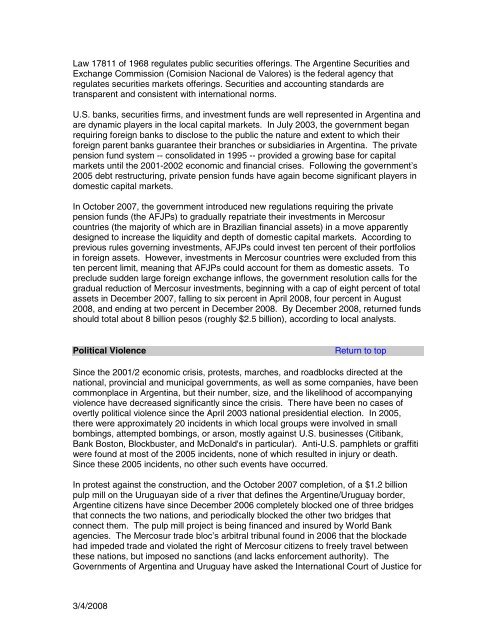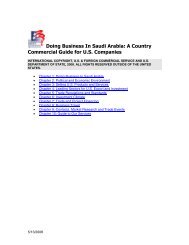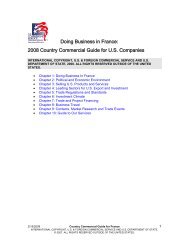Create successful ePaper yourself
Turn your PDF publications into a flip-book with our unique Google optimized e-Paper software.
Law 17811 of 1968 regulates public securities offerings. The Argentine Securities and<br />
Exchange Commission (Comision Nacional de Valores) is the federal agency that<br />
regulates securities markets offerings. Securities and accounting standards are<br />
transparent and consistent with international norms.<br />
U.S. banks, securities firms, and investment funds are well represented in <strong>Argentina</strong> and<br />
are dynamic players in the local capital markets. <strong>In</strong> July 2003, the government began<br />
requiring foreign banks to disclose to the public the nature and extent to which their<br />
foreign parent banks guarantee their branches or subsidiaries in <strong>Argentina</strong>. The private<br />
pension fund system -- consolidated in 1995 -- provided a growing base for capital<br />
markets until the 2001-2002 economic and financial crises. Following the government’s<br />
2005 debt restructuring, private pension funds have again become significant players in<br />
domestic capital markets.<br />
<strong>In</strong> October 2007, the government introduced new regulations requiring the private<br />
pension funds (the AFJPs) to gradually repatriate their investments in Mercosur<br />
countries (the majority of which are in Brazilian financial assets) in a move apparently<br />
designed to increase the liquidity and depth of domestic capital markets. According to<br />
previous rules governing investments, AFJPs could invest ten percent of their portfolios<br />
in foreign assets. However, investments in Mercosur countries were excluded from this<br />
ten percent limit, meaning that AFJPs could account for them as domestic assets. To<br />
preclude sudden large foreign exchange inflows, the government resolution calls for the<br />
gradual reduction of Mercosur investments, beginning with a cap of eight percent of total<br />
assets in December 2007, falling to six percent in April 2008, four percent in August<br />
2008, and ending at two percent in December 2008. By December 2008, returned funds<br />
should total about 8 billion pesos (roughly $2.5 billion), according to local analysts.<br />
Political Violence Return to top<br />
Since the 2001/2 economic crisis, protests, marches, and roadblocks directed at the<br />
national, provincial and municipal governments, as well as some companies, have been<br />
commonplace in <strong>Argentina</strong>, but their number, size, and the likelihood of accompanying<br />
violence have decreased significantly since the crisis. There have been no cases of<br />
overtly political violence since the April 2003 national presidential election. <strong>In</strong> 2005,<br />
there were approximately 20 incidents in which local groups were involved in small<br />
bombings, attempted bombings, or arson, mostly against U.S. businesses (Citibank,<br />
Bank Boston, Blockbuster, and McDonald's in particular). Anti-U.S. pamphlets or graffiti<br />
were found at most of the 2005 incidents, none of which resulted in injury or death.<br />
Since these 2005 incidents, no other such events have occurred.<br />
<strong>In</strong> protest against the construction, and the October 2007 completion, of a $1.2 billion<br />
pulp mill on the Uruguayan side of a river that defines the Argentine/Uruguay border,<br />
Argentine citizens have since December 2006 completely blocked one of three bridges<br />
that connects the two nations, and periodically blocked the other two bridges that<br />
connect them. The pulp mill project is being financed and insured by World Bank<br />
agencies. The Mercosur trade bloc’s arbitral tribunal found in 2006 that the blockade<br />
had impeded trade and violated the right of Mercosur citizens to freely travel between<br />
these nations, but imposed no sanctions (and lacks enforcement authority). The<br />
Governments of <strong>Argentina</strong> and Uruguay have asked the <strong>In</strong>ternational Court of Justice for<br />
3/4/2008












